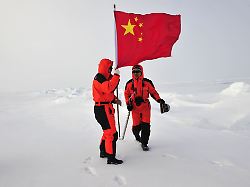The Arctic Silk Road
China secures new routes into the world
By Andrea Sellmann and Mary Abelaziz-Ditzow
01/21/2023, 6:00 p.m
With the construction of the “New Silk Road”, China is establishing new trade routes in many parts of the world. Europe has been idly watching for a long time, but now wants to step up. But Beijing has long been working on the next mega-project: a route through the Arctic.
The history of the Silk Road begins long before our era: traders used a huge network of caravan routes as early as 200 BC. Their camels transported spices and medicines, precious stones, furs and, of course, silk. The trade routes stretched over 6400 kilometers, crossing steppes, deserts and mountains. The old Silk Road paved the way for Chinese traders to the Roman Empire.
With the new Silk Road, China wants to renew and expand the ancient trade routes. The Chinese have been investing in infrastructure since 2013, building and optimizing routes, roads and ports on three continents. The dimensions are hard to imagine, the investments are estimated at around 900 billion US dollars. Hendrik Wehlen, logistics professional at Europe’s largest wagon hire company VTG, has followed developments on the rails closely: In ten years, the number of trains from China to Germany has increased from 80 to 15,000, he says in the podcast “Wirtschaft Welt & Weit”.
Way through the polar sea
There has also been massive growth in container shipping on the maritime Silk Road, which connects China with India and Africa and leads through the Suez Canal to the Mediterranean Sea. A ship from China to Germany takes about 25 to 30 days, including “normal” waiting time. If China’s head of state Xi Jinping has his way, this time will be shorter in the future. Xi is pursuing an idea for which he even takes advantage of climate change: the Arctic Silk Road. The way through the polar sea is much shorter. The ships are ten days faster on average, and fuel costs are also falling. And even now the use of icebreakers on the route is only necessary in winter.
The more the ice melts, the more profitable this idea becomes. But European critics don’t just look at economic interests. Environmentalists are worried about the fragile ecosystem, also in view of the immense mineral resources suspected in the Arctic. In addition, the proximity to Russia is questionable. The country has around 15,000 miles of Arctic coastline and controls the entire Northeast Passage. Ships have to pay for passage, and Russia is also building the icebreakers. European customers have been avoiding the land route and the route along the Russian coast since the war in Ukraine, reports logistician Wehlen.
EU wants to counter with “Global Gateway”.
With the broad-based Silk Road Initiative, China has made its importance as a trading power more than clear over the past decade. The EU has only recently attempted to take countermeasures. Your own initiative “Global Gateway” wants to promote infrastructure projects worldwide, but at the same time keep an eye on sustainability criteria and the well-being of the partner countries, because this is exactly what China criticizes.
But while the EU mainly discusses, China has long established facts. In view of the enormous lead of the Chinese, the race to catch up in Africa already seems in vain. “Europe simply woke up too late,” confirms Andreas Breinbauer, a logistics professor from Vienna. And “Global Gateway” has not yet had an eye on the Arctic.
Investments in the Russian part have been out of the question since Putin’s invasion of Ukraine. However, the Scandinavian Arctic could also become an increasingly strategically important point economically, because China’s Arctic Silk Road could be connected here in the future with the existing overland trade routes .
What does Germany have to do in order to still play an important role in the economic world of tomorrow? Who are we dependent on? Which countries benefit from the new world situation? Mary Abdelaziz-Ditzow discusses this in the ntv podcast “Wirtschaft Welt & Weit” with relevant experts.
You can find all episodes in the ntv app or wherever there are podcasts: at RTL+ music, Apple Podcasts, Google Podcasts, Spotify, Amazon Music or deezer. For all other podcast apps, you can use the RSS feed.
